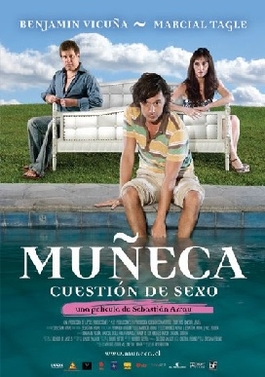
31 minutos is a Chilean comedy television series and a children's music virtual band created by the production company Aplaplac that was first broadcast March 15, 2003 on Televisión Nacional de Chile (TVN). The program is a parody of 60 Minutos, a controversial news program broadcast on the same channel throughout the 1970s and 1980s. Its format as a current affairs news program led by host Tulio Triviño frames a variety of unexpected and humorous events involving various members of the news team. The show features both explicit and implicit educational messages alongside content simply designed to show ridiculous and funny situations.
Chilean rock is rock music and its corresponding subgenres produced in Chile or by Chileans. Chilean rock lyrics are usually sung in Spanish so can be considered as part of rock en español, although they are sometimes sung in English as well.

Hans Gildemeister Bohner, is a Chilean former tennis player of German ancestry, who won four singles and 23 doubles titles during his professional career. The right-hander reached his highest singles ATP ranking on 22 February 1980, when he became world No. 12.
Nelson Bonifacio Acosta López, nicknamed Pelado Acosta, is a former Uruguayan-born Chilean football manager and footballer. He became a naturalized Chilean citizen in 1984 and managed several football teams. He is now retired.

Enrique Tomás González Sepúlveda is a Chilean artistic gymnast, the first of his country to medal at World Cup events, and the first to qualify for a Summer Olympic Games. He specializes in vault and floor exercises.

Magdalena Matte Lecaros is a Chilean businesswoman and politician. She is member of the Independent Democratic Union (UDI) and was part of Chile's Ministry of Housing and Urban Development under Chile's former President Sebastián Piñera for the term of 2010–2014. She is a member of the Matte family.

Pateando piedras is the second studio album by the Chilean group Los Prisioneros. It was released on September 15, 1986 in cassette format in Chile and 12-inch vinyl in South America. It was the group's first album to be released by a multinational company. It sold five thousand copies in its advance sale, and reached ten thousand units sold in a short time. The album was preceded by the hit single, "Muevan las industrias", which featured the group drawing European techno influences from bands like Depeche Mode.
The fifth annual Altazor Awards took place on 5 April 2004, at the Centro Cultural Matucana 100. The nominees were announced on 22 January.
Claudio Nicolás Calderón Ávila is a Chilean former footballer.

Carolina Nevenka Goić Borojević is a Chilean politician who served as president of the Chilean Christian Democratic Party (PDC) from 2016 to 2017.

Sebastián Silva Irarrázabal is a Chilean director, actor, screenwriter, painter, and musician.

Pedro Pablo Peirano Olate is a Chilean director, screenwriter, journalist, cartoonist and television producer. He wrote the film No, which was nominated for an Academy Award for Best Foreign Film in January 2013.

The presidential primaries of the Concertation of Parties for Democracy of the year 2005 was the electoral system to define the presidential candidate of such Chilean coalition for the presidential election of 2005. It confronted Michelle Bachelet Jeria, candidate by the Socialist Party (PS), the Party for Democracy (PPD), and the Radical Social Democratic Party (PRSD), and Soledad Alvear Valenzuela, candidate for the Christian Democratic Party of Chile (PDC). However, the process remained unfinished after Alvear retired from competition months before the completion of the primary.
MediaBanda is a Chilean musical group that is characterized by its eclectic and energetic proposal, nourished by several styles such as rock, jazz, funk, pop, latin American fusion and contemporary music, among others. It was formed in the year 2000 in Santiago de Chile by saxophonist and composer Cristián Crisosto. The ensemble's line-up is an expanded rock band that has varied in time but usually has a woodwind section as protagonists in addition to lead voices and a refined rhythm section.
The Big Boss World Tour was a concert tour by reggaeton singer Daddy Yankee to promote his album El Cartel: The Big Boss. This was his second arena tour in the United States and his first official world tour. The tour started on August 24, 2007, at the Coliseo de Puerto Rico and was expected to end on December 8, 2007, in Cali's Estadio Pascual Guerrero. However, due to the success of his soundtrack Talento de Barrio, more dates were added and the tour extended to 2008.

Álvaro Díaz González is a Chilean journalist, producer and director.

31 canciones de amor y una canción de Guaripolo is the second studio album by 31 Minutos. It was released in Chile on July 28, 2004 under the La Oreja Records label. It was reissued in 2007 by EMI in Mexico, and in again in Chile in 2012 by Feria Music.

Pedro Subercaseaux García de la Huerta, better known by his stage name Pedropiedra, is a Chilean musician and composer. In addition to his solo career including five studio albums, he has also served as drummer for Jorge González' and 31 minutos' bands, as well as being member of several other bands such as CHC (2001-2009) and the superband Pillanes since 2018 as a multi-instrumentalist.

Muñeca is a 2008 Chilean drama film directed by Sebastián Arrau and written by Arrau & Fernando Aragón. Starring Benjamín Vicuña and Marcial Tagle. It won the Great Paoa awards for Best National Film and Best Leading Actor (National) for Marcial Tagle at the 20th Viña del Mar International Film Festival.













